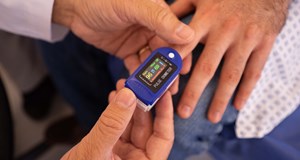What is the prostate?
The prostate is a walnut-sized gland that sits underneath the bladder and helps to make semen. The prostate gland usually grows bigger as you get older.
Who is at risk of getting prostate cancer?
Prostate cancer is the most common cancer in men and mainly affects men over 50, and your risk increases with age. The risk is even higher for black men and men with a family history of prostate cancer. A man whose father or brother has had the disease is 2.5 times more likely to develop prostate cancer than a man with no family history, so it’s important to be extra vigilant if a close relative has been diagnosed.
Prostate cancer is not always life-threatening. But when it is, the earlier you catch it the more likely it is to be cured.
Check your risk of getting prostate cancer
Prostate Cancer UK has shared a great tool to check the risk of getting prostate cancer - answer three quick questions to check your risk in 30 seconds.
Prostate cancer signs and symptoms to look out for
Most men with early prostate cancer don’t have any signs or symptoms. That's why if you are at a higher risk, you must have regular checks.
A total of 37% of prostate cancer cases are diagnosed late making it more difficult to treat. Possible symptoms could include:
- difficulty starting to urinate or emptying your bladder
- a weak flow when you try to urinate
- a feeling that your bladder hasn’t emptied properly
- dribbling urine after you finish urinating
- needing to urinate more often than usual (especially at night)
- a sudden need to urinate – you may sometimes leak before you get to the toilet
These symptoms can all be caused by other health problems. But it’s still a good idea to tell your GP, so they can find out what’s causing them and make sure you get the right treatment - if you need it.
GP checks for prostate cancer
There is no single test to diagnose prostate cancer. But, there are a few simple tests that your GP can do to find out if you have a prostate problem. The main tests include a urine test to rule out a urine infection and a prostate specific antigen (PSA) blood test which can help indicate prostate cancer.
Regular prostate checks can:
- Detect issues early
- Improve treatment success
- Give peace of mind
If you’re not sure how to start the conversation with your GP - print and fill out this form to help. Getting checked early on can make all the difference, as Derren found out.

Derren shared his story with us to help raise awareness and encourage men to get checked sooner
Let's normalise asking for help
Following in the footsteps of King Charles, who recently emphasised the importance of prostate health, let's prioritise our wellbeing too!
Men can be notorious for avoiding reaching out for help. According to our recent survey, 1 in 3 (33%) men said they did not seek support for their health and wellbeing in the last 12 months. This has increased by 5% from our 2021 survey!
We want to change this... let’s normalise asking for help. Let’s normalise going for a check-up. Let’s support each other - and Ben is always here to help. Don't suffer in silence, chat with us online, or call our free and confidential helpline on 08081 311 333 (Mon- Fri 8am - 8pm).
Living with prostate cancer
Approximately 400,000 men are living with and after prostate cancer in the UK. Living with prostate cancer can affect your everyday life, work and relationships. Even if you've stopped treatment you might still have side effects, and worry about your cancer coming back.
Staying as healthy as possible plays an important role. A healthy diet and regular physical activity are important for general health and can help you stay at a healthy weight. This may be particularly important if you have prostate cancer.
You can live a long time with prostate cancer. If you catch and treat it early, you might even be able to cure it.
Further support
If you work or have worked in automotive and you're struggling with this or anything else - we've got your back. Don't suffer in silence, chat with us online, or call our free and confidential helpline on 08081 311 333 (Mon- Fri 8am - 8pm).
For more information and guidance online check out Prostate Cancer UK's website they have some great resources to help.

Find what to look out for and where to go if you need help.







